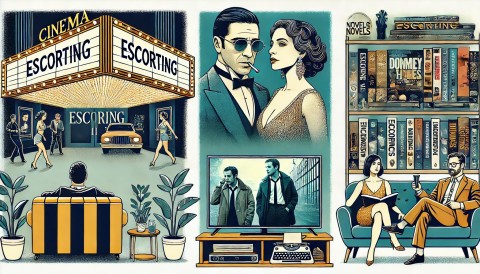Escorting has been a topic of fascination and intrigue in media for decades, appearing in movies, TV shows, and literature with varying degrees of accuracy and sensitivity. From glamorous depictions of Hollywood escorts to the high-end allure of escorts in New York, these cultural representations significantly influence public perception, often shaping societal attitudes towards the profession and those who work within it.
Escorting in Film & TV: Glamour vs. Reality
Movies and TV shows frequently depict escorting through a dual lens of glamour and grit. Films like "Pretty Woman" (1990) present a romanticized view of escorting, focusing on the potential for love and transformation. Julia Roberts’ character, Vivian, is portrayed as a "hooker with a heart of gold," who is rescued from her life on the streets by a wealthy businessman. This narrative reinforces the trope that sex work is a temporary state from which one can be saved, often by a benevolent, affluent man.
Conversely, shows like "Secret Diary of a Call Girl" (2007-2011) offer a more nuanced view, exploring the complexities of the profession. Billie Piper’s character, Belle, leads a double life, balancing her personal and professional identities while navigating the emotional and physical demands of her work. This series provides a glimpse into the autonomy and agency of sex workers, highlighting both the empowerment and the challenges they face.
Darker portrayals are seen in movies like "Leaving Las Vegas" (1995) and "Monster" (2003), where escorting is depicted as a symptom of deeper societal and personal issues. These films often focus on the dangers and hardships of the profession, painting a bleak picture that underscores themes of addiction, violence, and exploitation.
Literature: Diverse Narratives
Literature offers a broader spectrum of representations, from romanticized to realistic, often providing deeper insight into the lives of escorts. Novels like "Belle de Jour: Diary of a London Call Girl" by Brooke Magnanti present an insider’s perspective, offering candid accounts of the author’s experiences as an escort. This memoir challenges stereotypes by portraying the protagonist as educated, articulate, and in control of her choices, thus humanizing the profession.
In contrast, books like "The Happy Hooker: My Own Story" by Xaviera Hollander blend autobiography with social commentary, shedding light on the professional and personal lives of escorts. Hollander’s narrative emphasizes the empowerment and financial independence that escorting can provide, countering the dominant narrative of victimhood.
Influence on Public Perception
The portrayal of escorting in media plays a crucial role in shaping public perception. Positive representations that highlight autonomy, choice, and professionalism can contribute to a more nuanced and empathetic understanding of the industry. They can help dismantle stigma, promote respect for sex workers, and advocate for their rights and safety.
However, negative and stereotypical portrayals perpetuate harmful myths and biases. When media focuses solely on the dangers and moral degradation associated with escorting, it reinforces the idea that sex work is inherently exploitative and demeaning. This can lead to increased stigma, discrimination, and marginalization of sex workers, making it more difficult for them to seek support and protection.
The Role of Media in Advocacy
Media has the power to be an advocate for change by providing balanced and respectful representations of escorting. Documentaries and investigative journalism that explore the real lives of sex workers, their challenges, and their triumphs can foster greater understanding and solidarity. Platforms like Netflix and Hulu have started to produce more content that challenges traditional narratives, offering stories that are both compelling and educational.
Cultural representations of escorting in media are diverse, ranging from glamorized fantasies to gritty realities. These portrayals significantly influence public perception, either challenging or reinforcing societal attitudes towards sex work. By striving for more balanced and respectful representations, media can play a pivotal role in promoting empathy, understanding, and positive change within society.












